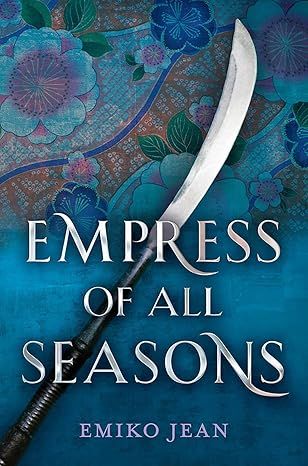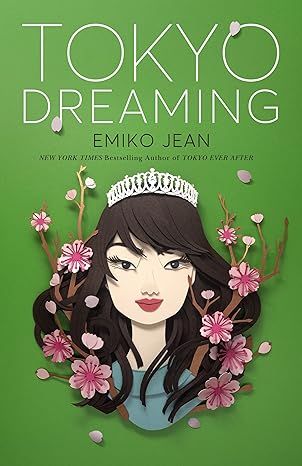Empress of All Seasons
4.3
-
346 ratings
Winter 2018-2019 Kids’ Indie Next List
In a palace of illusions, nothing is what it seems.
Each generation, a competition is held to find the next empress of Honoku. The rules are simple. Survive the palace’s enchanted seasonal rooms. Conquer Winter, Spring, Summer, and Fall. Marry the prince. All are eligible to compete—all except yokai, supernatural monsters and spirits whom the human emperor is determined to enslave and destroy. Mari has spent a lifetime training to become empress. Winning should be easy. And it would be, if she weren't hiding a dangerous secret. Mari is a yokai with the ability to transform into a terrifying monster. If discovered, her life will be forfeit. As she struggles to keep her true identity hidden, Mari’s fate collides with that of Taro, the prince who has no desire to inherit the imperial throne, and Akira, a half-human, half-yokai outcast. Torn between duty and love, loyalty and betrayal, vengeance and forgiveness, the choices of Mari, Taro, and Akira will decide the fate of Honoku in this beautifully written, edge-of-your-seat YA fantasy.
Kindle
$11.99
Available instantly
Audiobook
$0.00
with membership trial
Hardcover
$3.99
Paperback
$15.26
Ships from
Amazon.com
Payment
Secure transaction
ISBN-10
0358108268
ISBN-13
978-0358108269
Print length
400 pages
Language
English
Publisher
Clarion Books
Publication date
November 05, 2018
Dimensions
5.5 x 0.98 x 8.25 inches
Item weight
12 ounces
Product details
ASIN :
B07898L4Z1
File size :
6590 KB
Text-to-speech :
Enabled
Screen reader :
Supported
Enhanced typesetting :
Enabled
X-Ray :
Not Enabled
Word wise :
Not Enabled
Editorial Reviews
"With rich mythology and elegant atmosphere, Empress of All Seasons will latch onto your imagination and sweep you along for a magical and dangerous ride."-- Joelle Charbonneau, New York Times best-selling author of The Testing Trilogy.
Sample
Part I
One inch forward is darkness. —Proverb
Chapter 1
Mari
Breathing in the dark, and not her own.
Mari tilted her head. She couldn’t see in the pitch-black, but she closed her eyes. It helped her focus. She knew this space well, this room with no windows and an almost airtight door. Sometimes the musty smell invaded her dreams, morphed them into nightmares. The Killing Room, and Mari was executioner.
She inhaled, holding the stale air in her lungs. There, in the right corner, two feet away, someone waited. Afraid.
Mari stepped forward, the floorboards creaking under her weight.
“P-p-please,” a high-pitched male voice wailed.
“I’m not going to hurt you,” she said, letting a note of reassurance enter her voice. Not yet, anyway. She probed the wall. Her fingers brushed against a wooden ledge, then paper pulled tight over a bamboo frame. Matches rested next to the lamp. She struck one and lit the cotton wick, illuminating the room in a soft glow. The scent of rapeseed oil crept through the air. When her eyes refocused, she saw that the man was dressed in hakama pants and a surcoat. Samurai garb. The uniform of the military elite.
“Gods and goddesses,” he said, mouth lifting into a sneer, “I thought you were one of them. Why, you’re no taller than a sapling! What happened, little girl, did you lose your mommy?”
Mari regretted her paltry effort to comfort him. That’s what you get for being nice. Men. They always underestimated her.
Opposite the man, a variety of weapons leaned in the corner: a sickle and chain, a bow and arrow, a nunchaku . . . Mari gestured toward them. “Choose.” She liked to give the men a fighting chance. I’m sporting that way.
The samurai huffed. “You don’t know what you ask, little girl. I trained at the Palace of Illusions with the shōgun himself.”
Mari clenched her teeth. This was growing tedious. “I said, choose your weapon.”
The samurai strolled to the corner. He rifled through the weapons and selected a katana and a wakizashi.
Predictable. The long and short swords were samurai weapons. Her opponent brandished them, sharp-edged steel blades glittering in the lamplight.
Mari sauntered to the corner and quickly chose her own instrument. Always the same. The naginata. The reaping sword was a long bamboo pole culminating in a wicked curved blade. Thought to be a woman’s weapon, none of her opponents ever selected it. It was the only weapon Mari knew how to wield. “If you train on all weapons, you will master none,” her mother always said.
Mari stamped the naginata on the ground. Dust billowed around the hem of her navy kimono. “I’m very sorry, but from this moment, you’re dead,” she said, unsheathing the blade.
The samurai laughed, the sound robust and biting.
Mari cut his chortle short. She dipped into a crouch, letting the pole end of the naginata swing out in an arc, clipping the back of the samurai’s knees.
He collapsed with a loud thud. Mari winced. The big ones always fall the hardest.
“That was a mistake,” he said, clambering to his feet. He crossed the swords in front of him, a dangerous glint in his eye.
At least he’s taking me seriously now. “No,” Mari corrected. “That was intentional.”
The samurai rushed her, and she followed suit. The blade end of her naginata clashed against his big sword. Sparks flew.
The samurai jabbed with the smaller sword, and Mari dodged. A hairsbreadth from being impaled. That was too close. Her pulse quickened with fear and excitement. This samurai is well-trained. Before the samurai could pull back, Mari began twisting the naginata, catching both of his weapons in the windmill. Forced to let go, the samurai dropped his swords, which scattered to the ground, a few feet away. Well-trained, but not as well-trained as I.
She couldn’t allow him time to take a breath, to reach for his weapons. End this. She snap-kicked, her right foot connecting with his abdomen. The samurai grunted and doubled over. He clutched his stomach as he tipped to the ground.
She stood over him, breath ragged, victory sealed. Warmth radiated through her body. She felt the beast rise within her, felt her brown eyes dissolve into twin black abysses. Her hands flexed as muscles spasmed and bones popped. Her fingernails grew into black pointed talons. The skin on the back of her hands bloomed with leathery, charcoal-colored scales as tough and thick as a rhinoceros hide. She ignored the agony of transformation. She had trained herself to shut it out.
The samurai stared, horror-struck.
She knew she looked hideous—still part human, but with the eyes and hands of a monster. She brought her face close to the samurai’s, and when she spoke, her voice came out as a rasp. “You were right after all. I am one of them.”
Chapter 2
Taro
Taro rubbed the mark between his eyebrows, where pain blossomed. For someone chosen by gods and goddesses, he’d certainly suffered his fair share of ailments during his seventeen years of life.
The ache between his eyebrows pulsed, beating in time with the hive of activity surrounding him. In the Main Hall, servants bustled, scrubbing the zelkova floor on hands and knees, dusting the rafters with peacock feathers, polishing the four sets of statuesque doors, one for each season. Preparations for the competition had begun weeks ago.
Most days, the commotion was enough to grate on Taro’s nerves, a reminder that his hard-won solitude would soon end. But today, that was not what annoyed him. Today it was a disturbance so great that he’d heard it from inside his workroom, clear on the other side of the palace.
His features darkened at the spectacle before him. Two imperial samurai, clad in black lacquered armor, dragged a screaming kappa into the Hall. A muscle ticked in Taro’s jaw at the sound of nails scraping across metal. The kappa’s green webbed feet left a trail of slimy, muddy water on the high-glossed floor. A servant girl who had just finished cleaning it gasped and skittered off, vacating the space with the rest of the workers.
Behind the kappa trailed a retinue of priests. Their dove-gray robes brushed the ground, their steps careful and measured. Their voices were synced as they chanted curses in a song so beautiful, it made humans weep.
Unfortunately for the prisoner, the words were earsplitting to kappa, indeed to all yōkai. Chains, shackles, and wooden cages were unnecessary. The priests’ chants kept the kappa locked tight in an invisible torture chamber.
Smaller than a human child, with a turtle-like shell on his back and an orange beak protruding playfully from his feathered face, the kappa didn’t appear to be a threat. He was sweet-looking. Cute. Seemingly benign.
Things are rarely as they appear. Taro knew this to be true. He lived in the Palace of Illusions, after all. He also knew that kappa were notorious for their strength, possessing five times that of a human man, and for their love of entrails, usually harvested from live victims. Taro placed a hand over his stomach. No wonder the servants fled the Hall.
The kappa’s screams ceased, quieting to a coo. The language he spoke was unintelligible to humans, but Taro recognized the plaintive tone of his voice. The kappa pleads for his life. As they passed, the samurai and priests bowed to the emperor’s son. Taro inclined his head, the barest hint of recognition.
The entourage slowed at a set of mahogany and cypress doors. A bar, made from the trunk of a thousand-year-old oak tree, rested across, blocking what was inside from getting out. A relief of a mountain covered in gleaming snow was carved into the wood.
The Winter Room. As with each of the Seasonal Rooms, it could be used for pleasure, or for pain.
Today, it is pain.
A sick feeling took root in Taro’s gut, but his countenance remained stoic. He was good at wearing masks. His favorite was a formidable expression. He used it often. So often that sometimes he forgot who lay beneath.
The samurai dumped the kappa just outside the Winter Room doors. The creature whimpered, its spindly limbs curling in like a dried leaf. Unwilling to watch, Taro flicked his gaze to the tattooed priests. Cobalt ink covered their bodies. Even their faces were permanently branded with swirling, calligraphed curses. If a yōkai touched a priest’s skin, it would burn.
Grunting, the samurai lifted the oak bar, then stepped back, the heavy wood weighing down their shoulders. The doors sprang open. Snow flurries escaped, melting in the warmth of the Main Hall. Icy air brushed Taro’s cheeks, and his lips twitched. From the depths of the room, he thought he heard the echo of his long-gone laughter. As a child, he’d played in the snowfields and hidden in the Ice Forest. Now only death walked there.
Footsteps echoed behind him. The priests and samurai sank to the ground. Stillness descended, punctuated by the low hum of the priests’ chants. Only one man commanded such a reception. Taro’s father, the emperor, divine ruler of humans and yōkai, Heavenly Sovereign, paused beside him. Heat rose on Taro’s neck as his father’s shoulder brushed his.
They were the same height now, almost mirror images of each other, except for the fine lines of aging that had settled around the emperor’s mouth and eyes. Their broad shoulders swathed in purple robes cut imposing figures. Their hair was shaved on both sides but left long on top and pulled into knots. On their left hips, they wore the long and short swords, a nod to their samurai training. It was not enough to be chosen by gods. Ruling an empire required strength and force, the fierceness of a dragon. Traits Taro had always lacked. Until now.
Born prematurely, Taro had been a sickly child, small and given to coughing fits. In the last two years, he’d undergone a semi-metamorphosis, shedding his frailty. His lungs had cleared, and his muscles had thickened, his build now as massive as a bear’s. Sometimes when he gazed at his hands, he didn’t recognize them, the blunt strength in his fingertips, the power of his grip.
Taro kept his eyes forward as the emperor cast him a searching glance. If his spine straightened any more, it might snap. His father studied Taro often, now that he’d grown.
“Father,” Taro said in a monotone.
“Son,” the emperor replied. The emperor’s voice always made Taro think of rusted iron—cold, hard, crusted, useless. “I thought you would be off playing in your workroom.” Taro swallowed against the bite of his father’s tone. The emperor had very definitive views on what made a man. Men did not cry. Men were not small. Men sought power and dominion. Taro spent most days avoiding his father.
The emperor’s driving purpose was to rid the East Lands of yōkai. Taro craved privacy, quiet spaces where he could invent things. If I didn’t know better, I’d think you were made up entirely of gears and springs, his childhood nurse had often commented. The emperor certainly never understood his son’s passion for engineering. Rumors swirled that there was a time when the emperor had been softer, that he had loved deeply and without judgment. If this was once the case, Taro had never witnessed it. And as for Taro, he knew what the servants and courtiers whispered about him. The Cold Prince. More metal than human. A man without a heart. Perhaps this was true.
“I heard the commotion.” Taro didn’t bother to hide his annoyance. A muscle rippled along his jaw.
“We caught a kappa in the moat,” said the emperor.
Taro expelled a breath. The kappa must have been starving to risk coming so close to the palace.
His father arched a single silver brow. “Unbelievable, isn’t it?” The emperor waved an impatient hand and spoke loudly. “Enough.”
The chanting ceased.
The kappa stilled. His eyes—black, wounded, beseeching—rested on the emperor.
“His odor is offensive,” the emperor intoned. The Main Hall did smell like fish and pond water. The emperor jerked his chin. “Throw him in the Winter Room.”
Kappa may not understand human words, but this one clearly comprehended a death sentence. The kappa’s eyes sharpened into resolute points. The creature opened its beak, screamed, and shoved the samurai.
For one glorious moment, the imperial guards were airborne, their bodies graceful arcs, hyperextended in space, and Taro marveled at the small yōkai’s strength. The samurai crashed into the wall with a dull clunk, slumped and dazed.
A gust of snow from the Winter Room swirled into the Hall, obscuring Taro’s vision. Out of the white, the kappa barreled toward Taro and his father, webbed hands outstretched, beak open in a shriek.
Taro squared his shoulders, counted his breaths. One. Two. Three. His mask did not slip. Nor did the emperor’s. For all their differences, they shared a few traits. A cold air. Pride. No one would dare defy the emperor or the prince. To do so would be to court the wrath of the gods and goddesses. Religion was the emperor’s greatest weapon.
The priests quickly resumed their chanting, climbing to their feet and beginning to sway. The kappa paused, clasping his webbed hands over his ears. A futile effort. The air thickened and crackled with the priests’ incantations. The Hall grew colder. The kappa toppled to his knees, doubled over. Paralyzed.
The emperor barked at the dazed samurai. “Get up.”
Slowly, the samurai regained their wits and dragged the kappa’s limp body to the threshold of the Winter Room. Taro turned a cheek as they threw him in.
If the kappa was lucky, the frigid temperatures would kill him before the predators did. The Seasonal Rooms created their own weather, aided by Master Ushiba, the revered Seasonist. A blizzard could come. In the Winter Room, that might be the quickest way to die.
A final wave of cold air blasted Taro as the doors swung shut. At least it isn’t the Summer Room. His features tightened at the thought. The blazing heat pressed down like a hot iron, blistering the skin of its victims.
The oak bar thudded back into place. The kappa screamed, beating tiny fists, rattling the doors. Another futility. The doors would hold against the kappa; they held against oni, the strongest yōkai. Taro turned and began to stride away.
“You won’t stay?” his father called after him.
Something inside Taro clenched. A sound of disgust emanated from low in his throat, and he allowed his mask to slip, just this once. “I’m afraid not everyone has such a taste for death as you,” he replied.
The emperor laughed. “Go hide in your workroom. But I will expect you at dinner tomorrow night. We need to discuss the competition.”
Taro bit his tongue. The competition. His heavy footsteps matched the dull thud of his heartbeat. In a matter of days, hundreds of young women would descend upon the palace, armed and hopeful. The rules were simple: Survive the Rooms. Conquer the Seasons. Win the prince.
Taro seethed at the threat to his hard-won solitude and the ridiculousness of his being reduced to a prize to be won, a thing to be auctioned off. He shook his head. No. He would not stand idly by while his entire life was taken from him. Girls may come. They may conquer the Rooms. One may even win. But Taro would not marry her. He had a plan.
Read more
About the authors
Emiko Jean
Emiko Jean is a New York Times best-selling author of adult and young adult fiction.Her books have been published in over thirty languages. Her work has been featured on Good Morning America as a GMA book club pick, by Reese Witherspoon as a young adult book club pick, and in publications such as: Marie Claire, Entertainment Weekly, Time, Cosmopolitan, Shondaland and Bustle. She lives in Washington with her husband and two kids.
Read more
Reviews
Customer reviews
4.3 out of 5
346 global ratings
cvo
5
I love this book!
Reviewed in the United States on December 10, 2021
Verified Purchase
This is one of the best books I've ever read! great for young teens and older!😍
Amazon Customer
5
A beautifully written pageturner from Emiko Jean
Reviewed in the United States on March 21, 2019
Verified Purchase
Empress of All Seasons is truly a gem—I couldn’t wait to get home and keep reading! The novel follows protagonist Mari as she embarks on a journey to win the throne of Honoku and, in line with her Animal Wife ancestors, steal the prince’s riches. Along the way, she is confronted with the struggles of a typical teenage girl: love, friendship, and the fight for independence. The battles are intense, the pacing is quick, and more than once the plot dares to unravel with a well-executed flick of Mari’s naginata. This is a book that you’ll pick up to read for a few minutes only to find yourself still hanging onto every word an hour later.
Jean expertly crafts an entirely mystical world while creating struggles and characters that are relatable, and the story’s POV shifting kept me engaged. I was conflicted on Taro throughout and thought Jean did an excellent job wrapping his character up as the plot progressed. I felt for Akira and his need for love—and how refreshing that this quality fell to a male character rather than a woman! I certainly saw parts of myself and my own adolescent insecurity mirrored in Mari. Her realization regarding love at the end of the novel is a welcome twist that sets a wonderful example for young readers.
Jean’s biting social commentary separates this book from the rest. From the horrific treatment of yokai to Mari’s own doubts about her ability as a warrior, she sends a crucial message about the importance of celebrating and supporting difference rather than shunning it. Will definitely be recommending this book to young and old readers alike!
Read more
julia goldhirsh
5
Beautiful prose. Great world building
Reviewed in the United States on May 24, 2020
Verified Purchase
Prose- the prose was beautiful and the character revelations were stunning. So mant quotable lines. The prose kept me reading
Pacing- fast paced and on point. Kept me interested fron start to finish. A certain plot twist turned me off about 75% through but otherwise great.
World building- vivid and intricate world building. I felt like I was right there with the characters. I loved the sprinkling of Japanese but I have a deep undying love for all things Japan.
Characters- I loved the main character Mari in this story. Her character changes so much over time which makes her fun to watch. She's kind but strong and independent. I loved Akira's Akira's character arc although he annyoed me at times. I wasn't a huge fan of Taro's character arc. I thought he had more potential so that disappointed me.
Overall, I loved this story and hope to read more from this author. Great if you want a fast paced YA fantasy with plenty of Japanese mythology and nods to Japanese culture.
Read more
2 people found this helpful
Amazon Customer
5
Excellent book. Must read.
Reviewed in the United States on June 9, 2020
Verified Purchase
Page turner. I was very enthralled with this book. From the moment I read the sample until the last page. That said I was a tad disappointed with the ending only because I felt the author could have written a few more chapters to really delve into the conclusion but it was more disappointment that the book was over than anything to do with how it ended. How it ended was perfect. Excellent page turner that I suggest everyone read.
Read more
Nolly
5
Just buy it, its a great story!
Reviewed in the United States on September 13, 2020
Verified Purchase
My goodness, this is a wonderful book. It is so tangible. You feel the pains, the sadness, the fights, end up breathless. I love the animal/human magic, always have. It is a great choice if you're a fan of Japanese stories.
Top Emiko Jean titles
View allBest Sellers
View all
The Tuscan Child
4.2
-
100,022
$8.39

The Thursday Murder Club: A Novel (A Thursday Murder Club Mystery)
4.3
-
155,575
$6.33

Sapiens: A Brief History of Humankind
4.6
-
140,302
$13.49

The Butterfly Garden (The Collector, 1)
4.3
-
88,556
$9.59

Things We Hide from the Light (Knockemout Series, 2)
4.4
-
94,890
$11.66

The Last Thing He Told Me: A Novel
4.3
-
154,085
$2.99

The Perfect Marriage: A Completely Gripping Psychological Suspense
4.3
-
143,196
$9.47

The Coworker
4.1
-
80,003
$13.48

First Lie Wins: A Novel (Random House Large Print)
4.3
-
54,062
$14.99

Mile High (Windy City Series Book 1)
4.4
-
59,745
$16.19

Layla
4.2
-
107,613
$8.99

The Locked Door
4.4
-
94,673
$8.53





